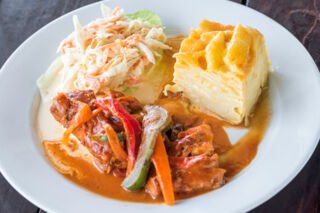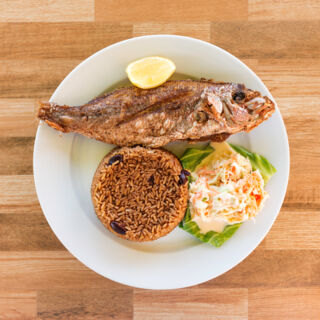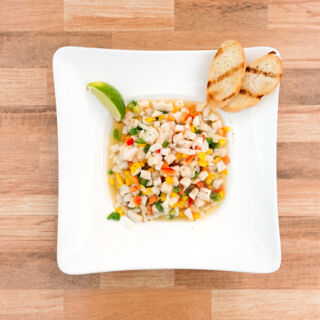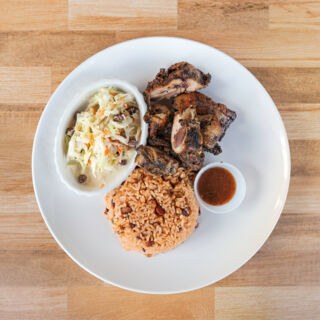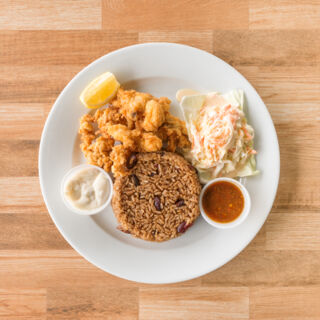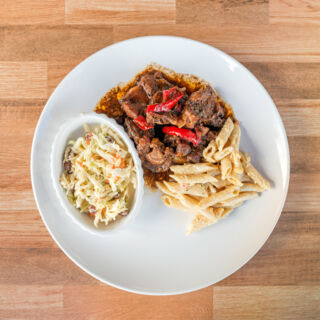Turks and Caicos Traditional Food & Cuisine
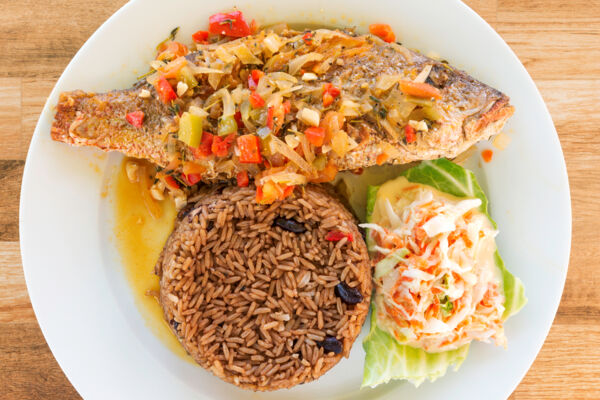
As is the case with most places, cultural and geographical factors have influenced the everyday foods of the Turks and Caicos, resulting in many unique dishes and tastes.
Today, it can be hard for visitors to find a truly authentic Turks and Caicos meal, especially on Providenciales and in the tourism area of Grace Bay. The less-populated islands of North Caicos, Middle Caicos, Salt Cay, and South Caicos are a bit closer to their roots, and are where old-style dishes are still commonplace.
Island Specialties
If you walk into any of the favorite island restaurants and ask for their signature dish, chances are that the answer will somehow involve conch.
There are several popular local ways to prepare this giant sea snail, which has historically been abundant in the Turks and Caicos Islands and fairly influential in local culture (from place names to the national flag and coat of arms). Commonly, conch in Turks and Caicos is breaded and fried as conch fritters, or served raw as a mixed conch salad. Conch salad traditionally incorporates lime juice and vegetables, with the acidic juices essentially ‘cooking’ the conch.
Other seafood, such as fish and lobster, also factors into the local cuisine of the islands. Fish stew and boiled fish are classic Turks and Caicos fish meals. Delicious grouper and snapper that is either pan-cooked or fried tends to be the more modern fish dish of choice. Lobster can be served a variety of ways, from hashed or steamed lobster to grilled lobster tails.
Some marine animals commonly consumed in Turks and Caicos have designated fishing seasons. Lobster season is open between August and March, while Nassau grouper season is open from March to November. It is illegal to harvest and consume these animals outside of their open seasons, so it's not always possible to enjoy them during your vacation.
History of Turks and Caicos Cuisine
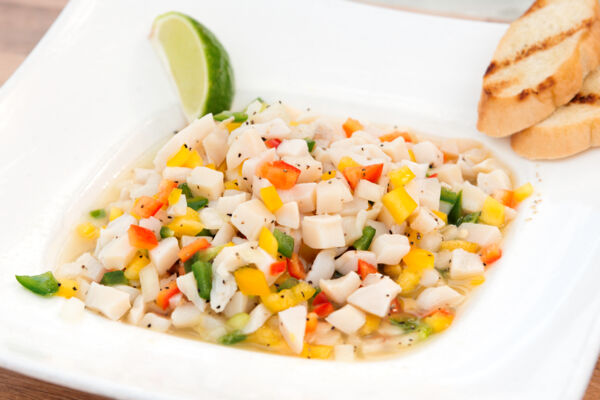
As would be expected for a small Caribbean nation, seafood has historically played a primary role in the local cuisine of the Turks and Caicos Islands.
Very little fertile soil and freshwater occur naturally in Turks and Caicos, so farming and agriculture has always been difficult. However, okra, peas, pigeon peas, peppers, beans, papaya, plantains, and maize were historically raised in little patches across the islands, and added some much-needed greenery and vegetables to the local diet. Drought-resistant maize, which was dried and ground into what was known as hominy or grits (a common traditional breakfast in the islands), was also grown and was largely used in place of the rice and cereals common today.
It’s still possible to see maize growing in some of the country's settlements, such as at Lorimers on Middle Caicos or on the remote west end of Providenciales near Wheeland.
Some food items could also be gathered from the land. Giant blue land crabs, common to many of the country’s wetlands, provided a bit of variance. Sea grapes and tamarinds added a bit of tang, and sugar apples were the main source of sweet.
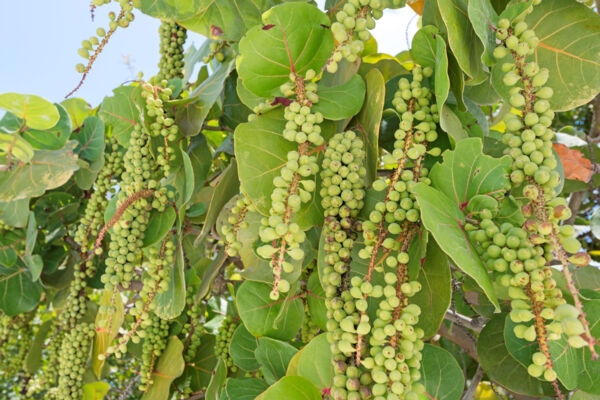
On the salt-producing islands, there was a bit more money to buy imported staples such as rice and some grains, as well as comparatively small quantities of tea, coffee, sugar, and salt meat.
Johnny cake, a pan-baked and slightly sweetened cornbread, largely took the place of wheat breads in the past. The name johnny cake is derived from journey cake, as this baked good preserved well and was a staple for fishermen and sailors embarking on long fishing or sloop trading trips.
Today, locally caught conch, lobster, and fish continue to define local dishes.
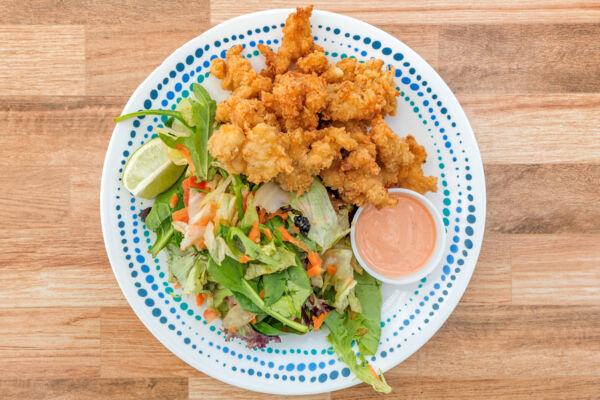
The agricultural scene in the country has seen much improvement due to the increased availability of freshwater (produced via desalination plants) and modern hydroponics. Both North Caicos and Providenciales have multiple farms that grow a range of produce and ingredients, such as tomatoes, cucumbers, papayas, mushrooms, herbs, and lettuce. Many of these fresh vegetables are becoming increasingly used throughout the country.
Interestingly, two of the most famous local dishes—conch fritters and conch salad—are relatively recent culinary inventions that weren't on the traditional menu 100 years ago.
Deep-fried fish is another relatively new cooking method. In the past, cooking oil was very hard to come by, so light pan-frying, poaching, boiling, or roasting was the norm.
A good current example of authentic local cuisine is pan-poached fresh grouper, peas and rice, and a side of locally grown mixed greens.
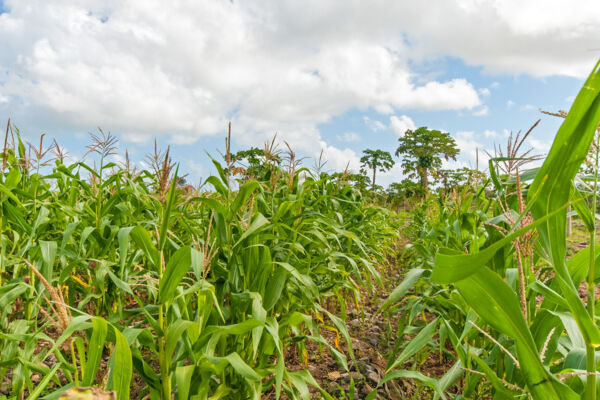
Regional Influences
Of the nearby Caribbean countries, the Bahamas and Jamaica have especially had an influence on modern Turks and Caicos cuisine.
Because of close geographical ties and natural population movements, the Bahamas has had the largest impact on local food. Many conch dishes and stews here were inspired by the neighboring country.
Originating more to the south, Jamaican BBQ jerk chicken and fish seasoned with scotch bonnet peppers added another flavorful element to the archipelago's cuisine.
Elements of Haitian cuisine, typically known as Haitian creole, have been brought over by immigrants from nearby Haiti. Pork griot is an example of a locally popular and imported Haitian dish.
Turks and Caicos Food Restaurants
If you want to eat like a local on your vacation to the Turks and Caicos, there are several places where you can try some authentic island food. Local opinions on the best restaurant for Turks and Caicos food vary, but some of the tastiest local seafood dishes can be found at Mangrove Bay Restaurant on Providenciales and Sunset Café & Bar at Cockburn Harbour on South Caicos.
Popular for both its local cuisine and beachfront location, Da Conch Shack specializes in cooking conch and local fish a variety of ways. If you're at the beginning of your visit (or the end) and want to try local grits, stop by Gilley's Restaurant at the Providenciales International Airport (PLS). The restaurant serves grits for breakfast.
Places to Try Local Cuisine
